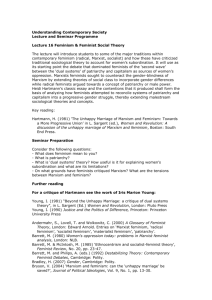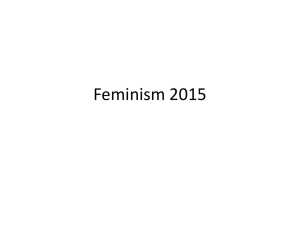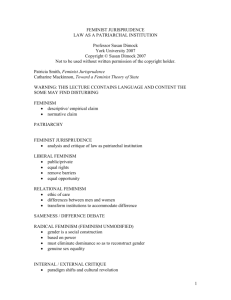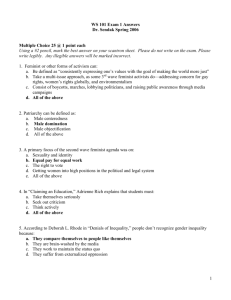`Feminist Social Theory` by Stevi Jackson in Contemporary Feminist
advertisement
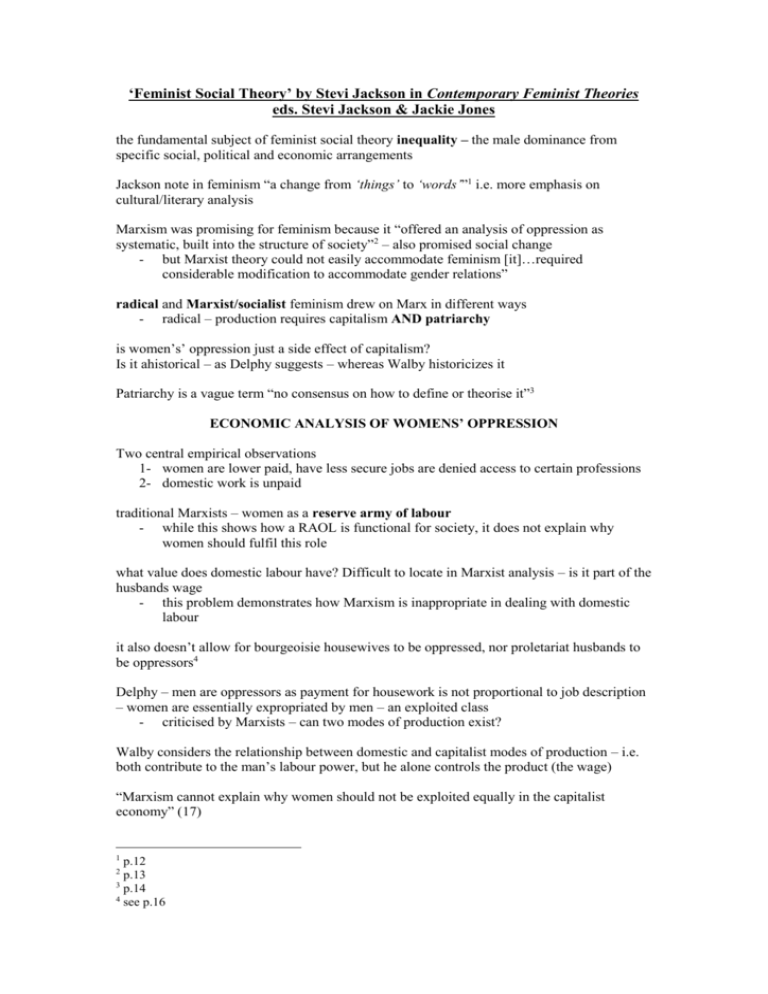
‘Feminist Social Theory’ by Stevi Jackson in Contemporary Feminist Theories eds. Stevi Jackson & Jackie Jones the fundamental subject of feminist social theory inequality – the male dominance from specific social, political and economic arrangements Jackson note in feminism “a change from ‘things’ to ‘words’”1 i.e. more emphasis on cultural/literary analysis Marxism was promising for feminism because it “offered an analysis of oppression as systematic, built into the structure of society”2 – also promised social change - but Marxist theory could not easily accommodate feminism [it]…required considerable modification to accommodate gender relations” radical and Marxist/socialist feminism drew on Marx in different ways - radical – production requires capitalism AND patriarchy is women’s’ oppression just a side effect of capitalism? Is it ahistorical – as Delphy suggests – whereas Walby historicizes it Patriarchy is a vague term “no consensus on how to define or theorise it”3 ECONOMIC ANALYSIS OF WOMENS’ OPPRESSION Two central empirical observations 1- women are lower paid, have less secure jobs are denied access to certain professions 2- domestic work is unpaid traditional Marxists – women as a reserve army of labour - while this shows how a RAOL is functional for society, it does not explain why women should fulfil this role what value does domestic labour have? Difficult to locate in Marxist analysis – is it part of the husbands wage - this problem demonstrates how Marxism is inappropriate in dealing with domestic labour it also doesn’t allow for bourgeoisie housewives to be oppressed, nor proletariat husbands to be oppressors4 Delphy – men are oppressors as payment for housework is not proportional to job description – women are essentially expropriated by men – an exploited class - criticised by Marxists – can two modes of production exist? Walby considers the relationship between domestic and capitalist modes of production – i.e. both contribute to the man’s labour power, but he alone controls the product (the wage) “Marxism cannot explain why women should not be exploited equally in the capitalist economy” (17) 1 p.12 p.13 3 p.14 4 see p.16 2 - but material analysis is still useful (Walby, Harmann) REPRODUCTION & CONTROL OF WOMEN’S SEXUALITY Analysis of this sort must avoid the risk of biological reductionism It can be a problem looking at the roles women do today, and assuming that they were ‘destined’ to do them – a problem of “classic functionalist teleology: projecting current functions into the past and treating them as causal origins”5 Jackson argues that Firestone’s analysis – often taken as radical feminism is in fact “highly individual and idiosyncratic”6- inequality bases on two distinct biological classes Mackinnon – centralises sexuality as the subject of feminism Wittig – heterosexuality as ‘class relationship’ IDEOLOGY, DISCOURSE AND CULTURE Althusser – ideology relatively autonomous from economic relations – attractive to feminists “if ideology no longer had to be seen as a superstructural reflection of the economic base of society this created a space to theorise women’s subordination without having to relate it to the capitalist mode of production”7 Mitchell – women’s subordination DID have an economic base in pre-capitalist societies, but now it is primarily ideological – a ‘cultural revolution’ is required The body of thought held that language was important in perpetuating patriarchy Foucault – truth is discourse, thus ideology cannot be dissproved by Marxism – - gateway to poststructuralist/postmodern forms of feminist thought the search for a single cause of women’s oppression assumes an unitary category – likely to be ethnocentric – likely to be ethnocentric hence a “further mandate for postmodern theorising” but is this intellectual cowerdice “simply taking refuge in an inpentrable elitist theory which does not require them to confront the realities of racism” debate – is “”postmodernism the only means of coping with the complexities of gender in a post colonial world, or [do] materialist structual analyses still have something to offer” Walby – resist postmodernism, as it constitutes a denial of inequality – it is possible to assert an underlying causal explaination despite differing histories and cultures – concept of patriarchy still valid 5 p.19 p.19 7 p.22 6 Some newer theories are based on “a revisioning of Marxism through the lens of postmodernism” –Gibson-Graham – housework as non-productive element in capitalist system – contextualised processes – not predefined groups and battlegrounds “The challenge for feminist social theory today is to analyses the localised contexts of women’s everyday existene and the meanings of women give to their lives without losing sight of the structural patterns of dominance and subordination”8 material approach still needed 8 p.28






